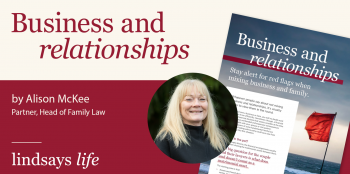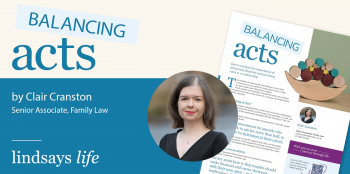Sometimes when you’re going through a separation from your husband or wife you’ll feel a level of distrust that your ex is misleading you about the nature and extent of their assets to avoid you getting a fair financial settlement.
It’s likely that you would feel aggrieved if you had agreed a settlement based on the assets which had been disclosed and then found out subsequently that your ex husband or wife had millions squirrelled away which you hadn’t been privy to, and which hadn’t been taken into account when considering the overall financial settlement between you.
This issue was brought before the UK Supreme Court by two aggrieved ex-wives recently in the English cases of Sharland (Appellant) v Sharland (Respondent) [2015] and Gohil (Appellant) v Gohil (Respondent) [2015] where actions were brought to set aside their divorce settlements due to their husbands concealing the full extent of their wealth.
Gohil - The facts
Mrs Gohil believed that her husband hadn’t provided a full and frank disclosure of his assets at the time of their divorce. They had reached an agreement about settlement on the basis of what he told her about his assets. Even although Mrs Gohil had noted formally during the course of the proceedings that she didn’t think her husband was being honest about his assets, she agreed to settle because she wanted to draw a line under matters.
Some time later she found out her suspicions about her husband had been accurate and she then applied to the court to have the financial settlement order set aside on the ground that her husband had failed to disclose his assets. The court agreed to set aside the order. Mr Gohil appealed. The Court of Appeal allowed his appeal. Mrs Gohil disagreed with the decision to allow her husband’s appeal and applied to the Supreme Court.
The Supreme Court unanimously allowed Mrs Gohil’s appeal and the original financial order was set aside.
Sharland - The facts
Mrs Sharland reached a settlement agreement with her husband in which she agreed to receive 30% of the sale proceeds from the sale of shares in her husband’s software company together with other assets. This was on the basis that during the court hearing, Mr Sharland had given evidence that there were no plans for an Initial Public Offering (IPO) of his company.
The court agreed to make an order in terms of the agreement reached by the couple but before the order was made, Mrs Sharland found out that her husband was actively preparing for an IPO of his company. She applied to the court to ask the court not to seal the order based on the earlier agreement reached with her husband but rather to resume the court hearing.
At the application hearing, the court found that Mr Sharland had been dishonest about his plans for his company and that had he been honest about his plans, the court would have continued the original hearing to clarify whether the IPO was going ahead. By the time proceedings were resumed, however, the IPO had not taken place and was no longer likely. The court declined to set aside the order based on the agreement reached on the basis that the outcome would not have been materially different.
Mrs Sharland appealed to the Court of Appeal which upheld the decision of the court at first instance. Mrs Sharland appealed to the Supreme Court.
The decision
The Supreme Court allowed both appeals.
In Mrs Gohil’s case the Supreme Court agreed to set aside the financial order on the basis that it could safely be concluded there had been a material non-disclosure by Mr Gohil.
In Sharland, Mrs Sharland was allowed to return to the Family Court for the court to resume consideration of matters. This was on the basis that the judge would not have made the order had it not been for Mr Sharland’s fraud.
The law
The recent decisions are about two English cases. In Scotland, it is common to enter into a Separation Agreement with your husband or wife upon separation in which you agree the division of your matrimonial assets before getting a divorce. Mr and Mrs Gohil had done the English equivalent of that.
The Separation Agreement is an enforceable contract between you both. It has long been established in Scotland that if you wish to have the Agreement set aside or varied by a court at a later date, you would be required to demonstrate that it was not fair and reasonable at the time it was made. The courts will look at a number of factors when considering whether or not this is the case and are not unduly willing to overturn agreements.
If the court in Scotland makes an order for financial provision and divorce and you find out subsequently that your ex wife or husband misrepresented their assets, you would require to raise an action seeking, essentially, to alter the divorce decree. In order to be successful you would have to establish that the orders for financial provision that were granted are neither fair nor reasonable, and that the alteration is necessary to produce substantial justice.
Comment
This decision is important as it highlights the importance of full and frank disclosure when it comes to your matrimonial assets and confirms that dishonesty will not be tolerated by courts.
It is essential that you seek legal advice about whether or not the court is likely to reconsider your Separation Agreement or court order. Lindsays’ specialist family law team can offer you advice about your likely prospects of success and make recommendations appropriate for your particular situation.








